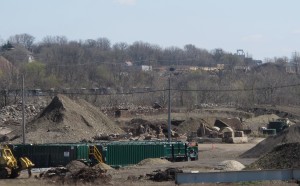Pa. Communities Craft Creative Escape Hatch from Drilling Law
-
Susan Phillips
While the Pennsylvania Supreme Court continues to deliberate the constitutionality of restrictions to local, Marcellus Shale, zoning regulations in the state’s new drilling law, a handful of communities across the Commonwealth are trying a unique approach to keep the industry away. “Community Bill of Rights” ordinances have been adopted by cities as large as Pittsburgh to ban fracking, and as small as Highland Township, Elk County, to prevent an underground wastewater injection well.
About 500 people live in Highland Township, a forested, rural area near the Allegheny National Forest in the northwestern part of the state. In January, Highland Township Supervisors passed the “Highland Township’s Community Rights and Protection from Injection Wells Ordinance,” essentially banning a planned injection well proposed by Seneca Resources. Deep injection wells in Pennsylvania require permits from both state regulators as well as the EPA. The EPA, which has primacy, is currently reviewing Seneca’s proposal but issued a draft permit in December. It’s unclear how this could play out in court, or even which court it would play out in, if it ever gets challenged by Seneca Resources.
The ordinance was drafted with help from the Community Environmental Legal Defense Fund, a small organization from Mercersburg, which has written 15 such ordinances opposing natural gas production throughout the Marcellus Shale region.
“We’re working on a different playing field here,” says CELDF projects director Ben Price. “And it’s necessary to do that. The industry has stacked the deck legislatively.”
The ordinance passed by Highland Township is not a zoning regulation. Instead, it’s written as a piece of civil rights legislation. So, no matter what happens with the Act 13 challenge, it won’t impact the Township’s ban of deep injection wells. But according to an attorney representing Seneca Resources, the ordinance violates both state and federal law. In a letter written by Brian Clark to Highland Township solicitor David Pontzer, Clark says the Township’s ordinance is preempted by state and federal law.
“It is important for you and the Township to recognize that the issue of local intervention in matters subject to federal and state preemption is extremely important to not only Seneca Resources but the entire natural gas industry in Pennsylvania,” wrote Clark in a letter to the township solicitor after learning of the ordinance. “Industry groups are cognizant of the Township’s action and the significance of legal issues involved. Neither Seneca Resources nor the industry will allow this ordinance to stand.”
Seneca Resources has not yet filed a court challenge, and according to the letter, the company has been unsuccessful in its attempts to speak directly to Highland Township supervisors and their attorney.
Ben Price, with CELDF, says none of the anti-fracking community bill of rights ordinances have been challenged. But if they are, the legal defense fund offers to represent the municipalities pro bono. He says the organization has helped write about 140 “community bill of rights” laws over the past 15 years, and only a handful have been challenged. Price says none have gone to federal court.
Seneca Resources applied for a class II underground injection well permit to convert a former shallow gas production well into a disposal well on their property in Highland Township. Seneca owns both the surface and the mineral rights. According to a fact sheet released to residents, the company chose the site because of its proximity to active natural gas wells, thereby reducing truck traffic. It also says more injection wells are planned. The proposal is to inject fracking wastewater from the company’s conventional and Marcellus wells into a porous sandstone formation about 1900 feet below the deepest part of the aquifer. The company released a detailed fact sheet, which describes the precautions they plan to take to protect the aquifer.
If the company does decide to challenge the ordinance, the Community Environmental Legal Defense Fund says it’s ready.
“The industry will probably try to argue that the state has the sole authority to regulate the oil and gas industry,” says Ben Price. “But [the Highland Township ordinance] is not written as a regulatory law.”
Price explains the logic of the community bill of rights this way. Every corporation operates at the behest of the legislature, which issues corporate charters in the name of the state’s residents. The legislature is elected to serve the residents of Pennsylvania. But if a company’s activities pose a threat to the health and safety of a community, the community has not relinquished to lawmakers in Harrisburg, their rights to restrict the actions of the company.
“What we’re doing,” says Price, “is saying we’re not going to play with their cards. We’re going with a different strategy. We’ll make them play with our deck. People have rights [to determine what happens in their communities.]”
A Highland Township Supervisor’s meeting is scheduled for this evening, where the issue is likely to be high on the agenda. One supervisor recently died, and another is facing criminal charges for causing the release of raw sewage into nearby surface water. So, they may also have other things to talk about.

















